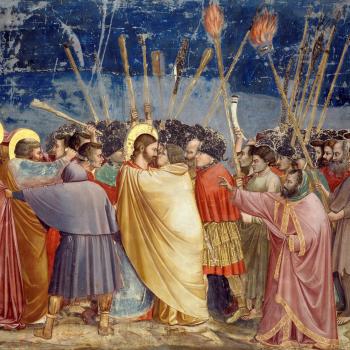Anything that starts this way:
If the Catholic Church makes G. K. Chesterton a saint—as an influential group of Catholics is proposing it should—the story of his enormous coffin may become rather significant. Symbolic, even parabolic. Chesterton’s coffin was too huge, you see, to be carried down the stairs of his house in Beaconsfield, its occupant being legendarily overweight at the time of his death, in 1936. So it went out a second-floor window. Very Chestertonian: gravity, meet levity. Hagiographers might pursue the biblical resonance here, citing the Gospel passages in which a paralyzed man, unable to penetrate the crowds surrounding the house in Capernaum where Jesus was staying, is lowered in through a hole in the roof. Or they might simply declare that Gilbert Keith Chesterton’s was a spirit too large to go out through the conventional narrow door of death—that it had to be received, as it were, directly into the sky.
In his vastness and mobility, Chesterton continues to elude definition: He was a Catholic convert and an oracular man of letters, a pneumatic cultural presence, an aphorist with the production rate of a pulp novelist. Poetry, criticism, fiction, biography, columns, public debate—the phenomenon known to early-20th-century newspaper readers as “GKC” was half cornucopia, half content mill. If you’ve got a couple of days, read his impish, ageless, inside-out terrorist thriller The Man Who Was Thursday. If you’ve got an afternoon, read his masterpiece of Christian apologetics Orthodoxy: ontological basics retailed with a blissful, zooming frivolity, Thomas Aquinas meets Eddie Van Halen. If you’ve got half an hour, read “The Blue Cross,” the first and most glitteringly perfect of his stories featuring the crime-busting village priest Father Brown. If you’ve got only 10 minutes, read his essay “A Much Repeated Repetition.” (“Of a mechanical thing we have a full knowledge. Of a living thing we have a divine ignorance.”)
….and ends this way(in The Atlantic of all places):
The campaign for the beatification of G. K. Chesterton has now reached the prayer-cards stage. Late last year, I walked into a Catholic church in Stowe, Vermont, and found on a table near the entrance a stack of cards inviting me to pray for Chesterton’s intercession “so that his holiness may be recognized by all and the Church may proclaim him Blessed.” In other words, I should ask him for a miracle. All right then, Gilbert, here it is: grant me a flash, just a flash, of your double-natured vision, the intuition that I, James Parker, have been summoned out of an “almost nihilistic abyss” into a world of radiant ordinariness, that my existence depends second by second upon the creative gesture of a loving God, continually renewed, and that I should be astounded and grateful. Make that happen, you rocketing squirrel in a fat man’s body, and I’m down for the cause.
…is worth reading.
And for the record, I am morally certain Chesterton is a saint, though I shall, of course, refrain from venerating St. GKC that way till the Church makes it official. The only thing that will get in the way (and not a few fellow Chestertonians tear their hair at me when I say this) will be his conventional Victorian and Edwardian views on Jews and some of his remarks on race. However, it should not be forgotten that GK’s life, like that of any saint has a story arc and that he changes over time under the influence of grace (which is what makes any person a saint). We don’t canonize people because they were flawless, but because they submitted their flaws and their virtues to the will of Jesus Christ and tried to do his will. GKC is, for me, a great window on to the work of Christ in the soul of a good man. I owe, not merely his writings him–he himself–a debt of gratitude for showing me what goodness looks like. To read him is to breathe fresh air.
Santo subito!















